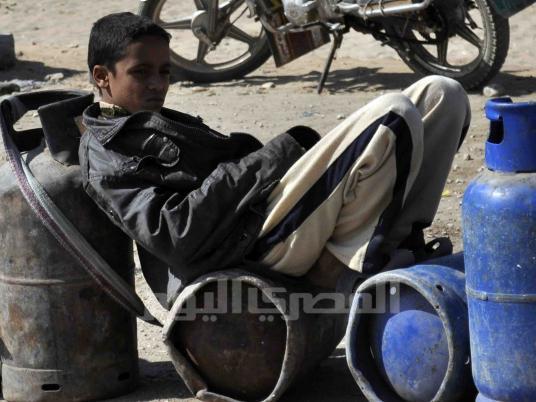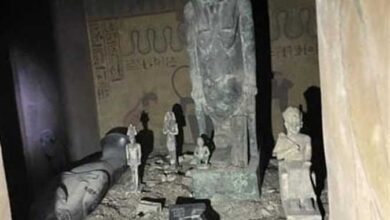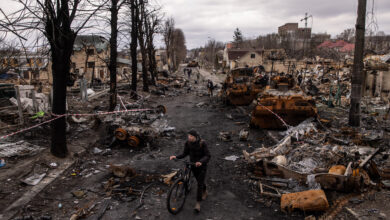
The trials and tribulations of the past 16 months have boiled down to what seemed to be a fairly unremarkable day, according to the independent press. Al-Tahrir’s headline acknowledges in its headline the low national turnout, while Al-Shorouk declares “boycott” as the day’s clear victor. “A calm first day of voting amid weak turnout and multiple violations,” the privately owned paper says, before elaborating on the violations which it claims were committed by supporters of both candidates. According to Al-Shorouk, forged ballots marked in favor of both candidates were found in the governorates of Kafr al-Sheikh, Qena, Sharqiya, Gharbiya and Giza. Presiding judges confiscated the ballots and reported them to the Presidential Elections Commission, the paper writes.
Al-Tahrir also reports on what it describes as “widespread violations,” including an incident in Sharqiya where one man apparently had 30 national identification cards in his possession and attempted to vote 30 different times.
The privately owned paper reports on another unusual violation, in which “an unknown man” walked into a Daqahliya polling station, had a brief, private conversation with the head of the station, and then “picked up a ballot box, walked out of the room with it without anyone objecting, and headed home.” Al-Tahrir writes that voters who did notice the incident and found it unusual joked about it, remarking that “maybe the man needed a bucket.” The paper explains that said “unknown stranger” was actually Hajj Mahfouz Abou Reish, who, as a 'sheikh ghafar' (a rural security position associated with guarding the mayor), was asked by the head of the governorate’s 29th polling station to take an extra ballot box mistakenly delivered to the station home until “he could deliver it to the [district]’s police station.”
State-owned papers look at the first day of run-offs with a different type of lens. “The people’s voice is between Morsy and Shafiq,” Al-Akhbar’s headline states, before informing its readers that television actress Ilham Shaheen voted for Mubarak-era Prime Minister Ahmed Shafiq who, she insists, “is not a dictator.” Other stars featured in the paper’s first page of elections coverage include the singer Hakim, former supposed sex symbol Nadia al-Gindy, and tanning enthusiast Hussein Fahmy.
Meanwhile, in Al-Ahram the “fierce” competition between the two candidates is reflected by twin pictures of them holding up their votes, and a warning by the Interior Ministry regarding “conspiracies” targeting “vital institutions,” namely the police force, through “individuals dressing as police officers and committing hostile acts.”
The paper then reports that an unspecified minister "indicated that polling proceeded in calm despite multiple violations including the apprehension of a Jordanian individual in the Moskie area of Cairo, directing voters towards a certain candidate outside of the stations.”
Meanwhile, head of the military police Hamdy Badeen confirmed that “some citizens have been intercepted while trying to prevent Beni Suef residents from casting their vote.” The paper then reports that “an individual in possession of five laptops” was arrested in Mansheyit Nasser while spreading pro-Shafiq propaganda. In Moqqatam, a microbus driver was arrested for “rounding up individuals and taking them to vote for Shafiq,” the paper reports, before providing details of the candidate’s own visits to the polling stations, with Morsy casting his vote in Zagazig, and Shafiq in the Fifth Settlement.
Privately owned Al-Dostour, on the other hand, kicks off its elections coverage by announcing that “Egypt will not become the next Afghanistan,” before warning its readers that “boycotting or abstaining means shaking Morsy’s hand because the [Muslim Brotherhood] will not boycott,” and that “if the [Brotherhood] succeeds, these will be the last democratic elections in Egypt.” A front-page report focuses on the Brotherhood’s attempts at forgery in the voting process, with several quotes by Farouk Sultan on the alleged “notebooks” of ballots delivered to a Sharqiya polling stations with Morsy’s name already checked. The paper reports that the Presidential Elections Commission is conducting an investigation into the violations.
In party paper Al-Wafd, Wagdy Zein al-Deen reflects on the importance of the constitution yet to be written, and the president’s role in it, after this Thursday’s announcement of who the next president will be. “It is illogical to assume the next president will have no restrictions, or be fully restricted,” he writes. He urges the SCAF to “issue a full constitutional announcement” to help “correct” past “bitter experiences” in forming the constitution. Zein al-Deen stresses the importance of including “a fine sample of the Egyptian people.”
All papers also report on the “magic marker” phenomenon. Apparently, rumors of polling stations' pens containing some sort of disappearing ink that would vanish after four hours on paper spread among voters, with Al-Shorouk reporting that “Morsy supporters were voicing their concerns on the internet and the street over the ‘magic’ markers in the polling stations filled with disappearing ink, while Shafiq supporters exchanged rumors that Morsy supporters were selling ‘magic’ Chinese pens outside the stations.”
In other news, Saudi heir apparent Prince Nayef Ibn Abdel Aziz, who was also the kingdom’s interior minister, died in Geneva following treatment for a knee complaint. He was 79 years old.




